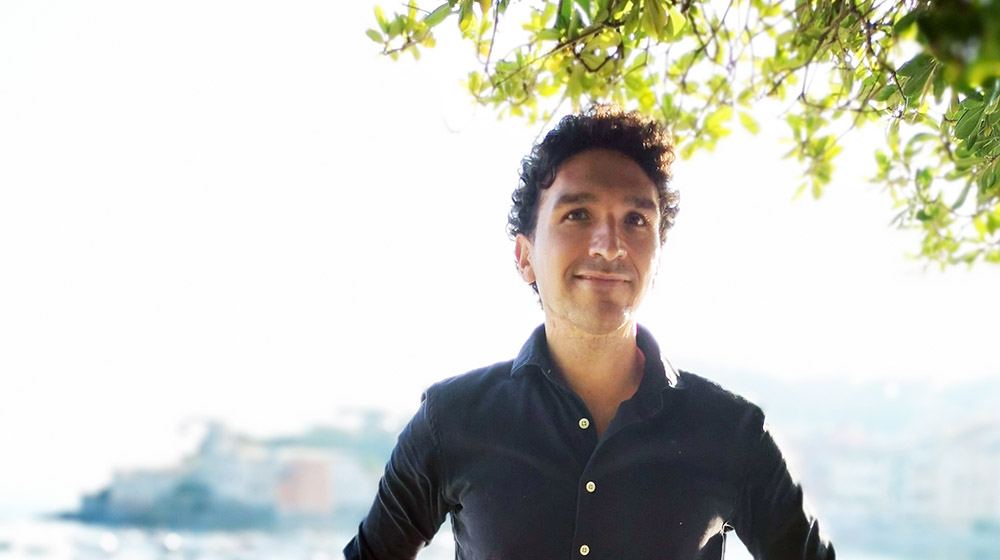Francesco Fuso-Nerini receives teacher award

He conducts extensive and pioneering sustainability-related education and research, and has started international collaborations spanning over many research areas. For that Francesco Fuso-Nerini at the ITM School receives the KTH Global Development Hub's teacher award 2021 in global sustainable development, which aims to contribute to and drive development towards the UN's global goals.
Francesco works as Associate Professor at the division of Energy Systems Analysis, but he likes to connect many research fields – working with societal challenges across disciplines, and all over the world.
KTH works together with partner universities in Africa since 2017. With the help of challenge-driven education students at both KTH and the partner universities work in various projects to implement solutions contributing to global sustainable development within the framework of Agenda 2030. Here, Francesco Fuso-Nerini has contributed with “both commitment and solid competence”, as the motivation of the prize goes.
What’s the attraction in your job?
“I am very enthusiastic about the emerging scientific field that uses the Sustainable Development Goals for guiding and supporting research, projects and policies. Working with those new research frontiers has been a continuous source of learning for me. It pushes me to look outside of my ´research comfort zone´, and connect with people from other fields and disciplines, trying to understand how changes in energy, climate change and AI sectors could be understood and directed with the SDGs.“
What is the work that you are most proud of?
“For me, I’m eager to share this expertise and commitment with other researchers from diverse teams at KTH. In collaboration with other KTH teachers I recently led and launched a PhD course called Sustainability Perspectives for Assessing and Designing Research, Projects and Policies. The 2021 edition of the course, gathered around 8 teachers and 40 PhD students across departments at KTH, together reflecting on how to tackle the world’s most pressing sustainable development challenges. All participants actively worked on how research at KTH can be shaped to maximize positive sustainable development impacts. That’s something I am proud of.”
“Another example is our work on integrated sustainable development research and planning. For instance, our initial call in Nature for shoring up support for climate action using SDGs that has been expanded into a full analysis in Nature Sustainability on how climate action could be harmonized with the SDGs. That analysis has now been referred in key policy documents such as the IPCC 6th Assesment report. Similarly, I have co-led landmark assessments on how energy and AI may affect the SDGs – and we are now trying to scale down those global-level assessments to direct and guide decisions at the local level.”
What does it mean to receive this award? Does it change anything?
“There are many outstanding researchers and teachers working on sustainable global development at KTH, therefore I am very honored to receive this recognition. I believe that this prize presents a strong signal from KTH on the importance of global sustainable development in research and teaching, and on the importance of international collaborations.”
“The prize is a valuable contribution to my team´s upcoming research on finding solutions to societal challenges within Agenda 2030. It will also facilitate new international collaborations, and will help improving and continuing the PhD course mentioned above.”
How come you have worked in so many countries in Africa?
“Since my MSc and PhD studies, I have been passionate on the topic of how to address intertwined energy, climate and services access issues in the global south. For instance, now almost 10 years ago, my team ended as runner up among 5000+ team in the Hult Global Case Challenge by proposing new models for the commercialization of solar lighting in East Africa. After that, I developed my PhD studies at KTH developing tools to support the challenge of providing sustainable energy access for all. That brought me to travel and develop field work in Kenya, Tanzania, South Africa (and Timor Leste and Brazil outside of SSA) among others. More recently, I have been supporting my team´s effort in developing probably the most used geospatial electrification tool in the world, and worked with creating a novel geospatial tool for accelerating the transition to clean and modern cooking for the 3 billion people without access to modern fuels for cooking. We have also worked with supporting climate-resilient planning among land, energy and water resources (also called ´Nexus´ work) in Jordan and Morocco. These and other experiences brought me to work and do research in several countries in the global south.
If you could make a wish to come up with one solution or innovation that benefited sustainable development and solved a problem, what would it be? Think big (as if it was the genie in the bottle asking)!
“Oh, how I wish that we could find a single silver bullet solution that benefitted sustainable development! Unfortunately, that is not possible. Research shows that in today´s intertwined societies a large array of solutions will be needed to address today´s global sustainable development challenges, such as the climate crisis. Also, for most of those solutions there will be winners and losers. For instance, hydropower projects to increase renewable energy shares and decrease carbon emissions may at the same time displace local populations and have impacts on local ecosystems. Moving away from fossil fuels to act on climate change may impact people and countries whose economy depend on it. And so on. As a start, I suppose my wish would be that stakeholders deciding on e.g. large projects and policies in any country would easily have access to the information to all the repercussions their decision may have, and more importantly, plan accordingly to avoid detrimental trade-offs while maximizing benefits of their decisions.”
Text: Anna Gullers
